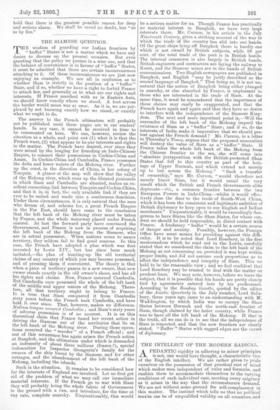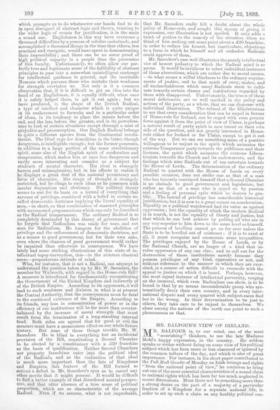THE INTELLECT OF THE MODERN RADICAL.
APEDANTIC rigidity in adhering to minor principles is not, one would have thought, a characteristic vice of the English intellect. We are rather given to pride ourselves on the possession of that practical cast of mind which makes men independent of rules and formulEe, and enables them to accommodate themselves to the varying conditions of each individual case, meeting every exigency as it arises in the way that the circumstances demand. We are not without some ground for self-complacency in this matter. The instinct which tells us that no political maxim can be of unqualified validity on all occasions, and which prompts us to do whatsoever our hands find to do in open disregard of abstract logic and. theory, trusting to the wider logic of events for justification, is in the main a sound one. Englishmen in this way have overcome a thousand difficulties by a process of solvitur anzbulanclo, and accomplished a thousand things in the time that others, less practical and energetic, would have spent in demonstrating their impossibility ; and there can be no surer proof of high political capacity in a people than the possession of this faculty. Unfortunately, we often allow our per- fectly true and legitimate sense of the fallibility of abstract principles to pass into a somewhat unintelligent contempt for intellectual guidance in general, and the inevitable Nemesis which pursues those who mistake their weakness for strength overtakes us. Not only is it a common observation that, if it is difficult to get an idea into the head of an Englishman, it is equally difficult, when once it is safely lodged there, to get it out again ; but we have produced, in the shape of the British Radical, a type of intellect and character which is quite unique in its enslavement to formulre and to a particular order of ideas, in its tendency to place the means before the end, and the less before the greater, and in its powerless- ness to look at certain situations except through a mist of prejudice and preconception. Our English Radical belongs to quite a different species from the Continental revolu- tionist. The blind rage for demolition in the latter, though dangerous, is intelligible enough ; but the former possesses, in addition to a, large portion of the same revolutionary spirit, some also of the English spirit of moderation and -compromise, which makes him at once less dangerous and vastly more interesting and complex as a subject for students of mental character. His ideal is strangely barren and unimaginative, but in his efforts to realise it he displays a great deal of the national persistency and force of character. His range of thought is strangely restricted, but he clings to such ideas as he possesses with insular dogmatism and obstinacy. His political theory seems to rest for its basis on a hatred of everything that savours of privilege, combined with a belief in certain so- called democratic doctrines implying the literal equality of men,—in short, on that combination of reasoned principles with unreasoned prepossessions which can only be described as the Radical temperament. The ordinary Radical is so completely dominated by this theory of government that he forgets that Radicalism was made for man, and not man for Radicalism. He hungers for the abolition of privilege and the enforcement of democratic doctrines, not as a means to good government, but for their own sake, even where the chances of good government would rather be impaired than otherwise in consequence. We have lately had some striking illustrations of this state of in- tellectual topsy-turveydom, this—in the strictest classical sense—preposterous attitude of mind.. Who, for instance, that is not a. Radical, can attempt to understand the position taken up by Mr. W. Saunders, the member for Walworth, with regard to the Home-rule Bill A measure is introduced for fundamentally reconstituting the Government of the United Kingdom and indirectly of of the British Empire. According to its opponents, it will lead to such weakness and. division in what is at present the Central Authority, that the consequences must be fatal to the continued existence of the Empire. According to its friends, any loss in concentration of power or in the efficiency of our institutions will be far more than counter- balanced by the increase of moral strength that must result from the termination of a long-standing internal feud. Both sides are agreed that for good. or evil the measure must have a momentous effect on our whole future history. But none of these things trouble Mr. W. Saunders. He is blind to everything but an incidental provision of the Bill, constituting a Second Chamber to be elected by a constituency with a. £20 franchise as the basis of qualification. Neither Second Chambers nor property franchises enter into the political ideal of the Radicals, and. as the realisation of that ideal is much more important than the fate of Kingdoms and Empires, this feature of the Bill formed. so serious a defect in Mr. Saunders's eyes as to cancel any other merits that it might possess. It would. be difficult to find a better example of that disordered mental perspec- tive, and that utter absence of a true sense of political proportion, which are so characteristic of the average Radical. Even if we assume, what is not improbable, that Mr. Saunders really felt a doubt about the whole policy of Home-rule, and sought this means of giving it expression, our illustration is not spoiled. It only adds a touch of pathos to the comedy of the situation when we think of him seeking out some point about a £20 franchise, in order to reduce his honest, but inarticulate, objections to a form in which he himself and all orthodox Radicals could approve of them.
Mr. Saunders's case well illustrates the purely intellectual vice of honest pedantry to which the Radical mind is so prone. It would be invidious to select individual instances of those aberrations, which are rather due to moral causes, —to what seems a wilful blindness to the ordinary require- ments of justice, and to that spirit of envy, malice, and all uncharitableness which many Radicals seem to culti- vate towards certain classes and institutions regarded by them with disapproval. Unfortunately, the traces of these moral deficiencies are so well marked in the policy and actions of the party, as a whole, that we can dispense with individual illustration. The refusal of the Gladstonians to see that every consideration that can be urged in favour of Home-rule for Ireland, can be urged with even greater force against it from the point of view of Ulster, is perhaps a natural result of party spirit in men intent on their own side of the question, and not greatly interested in Home- rule either for Ireland or for Ulster, except to get it out of the way. But we can see something more of a positive willingness to be unjust in the spirit which animates the extreme Temperance party towards the publicans and their licences, the spirit which animates the extreme Libera- tionists towards the Church and its endowments, and the feelings which nine Radicals out of ten entertain towards the House of Lords. The determination of the ordinary Radical to quarrel with the House of Lord e on every possible occasion, does not strike one as that of a man who has honestly convinced himself that a Second Chamber is an obstacle to good government and. legislation, but rather as that of a, man who is _urged on by passion and a feeling of personal spite which he desires to gra- tify. The hatred of privilege has considerable historical justification, but it is now to a great extent an anachronism. Equality as a political watchword had its value as against oppression ; but the equality of which the modern Radical is in search, is not the equality of liberty and justice, but that which he can best achieve by pulhng all who are in any way superior to him down to the same level as himself. The process of levelling cannot go on for ever unless the State is to be levelled out of existence ; if it is to exist at all, it must recognise and consecrate some inequalities. The privileges enjoyed by the House of Lords, or by the National Church, are no longer of a kind that in- volve oppression of any one else ; and to call out for the destruction of these institutions merely because they possess privileges of any kind, oppressive or not, and without reference to the manner in which they are exer- cised, is a course of action difficult to reconcile with the appeal to justice on which it is based. Perhaps, however, the most signal instance of intellectual perversity, verging on the immoral, which even Radicalism can show, is to be found in that by no means inconsiderable group who sys- tematically decry their own country, and in every inter- national dispute and every quarrel with subject-races find her in the wrong. In their determination to be just to others, they take care to be unjust to themselves. We alone among the nations of the earth can point to such a phenomenon as that.



































 Previous page
Previous page